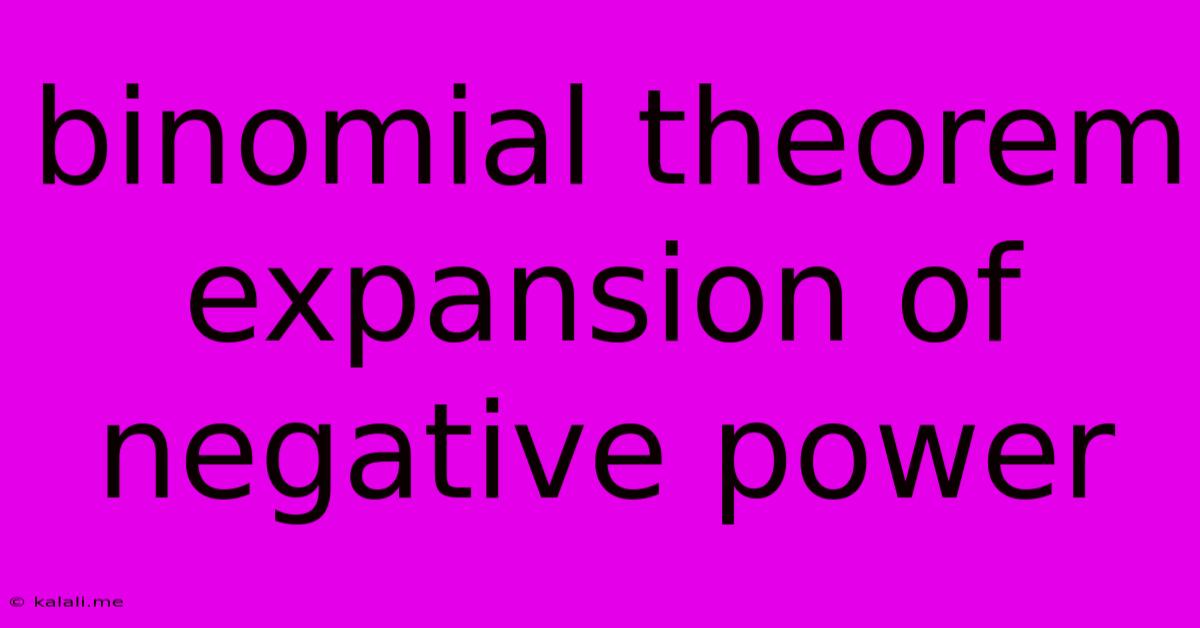Binomial Theorem Expansion Of Negative Power
Kalali
May 19, 2025 · 2 min read

Table of Contents
Binomial Theorem Expansion of Negative Powers: A Comprehensive Guide
The binomial theorem, typically used to expand expressions of the form (a + b)ⁿ where n is a positive integer, can be extended to encompass negative integer powers. Understanding this extension unlocks powerful tools for manipulating series and solving complex problems in calculus, probability, and other fields. This article delves into the intricacies of expanding binomials with negative exponents, providing a clear and concise explanation.
The standard binomial theorem states: (a + b)ⁿ = Σ (n k) aⁿ⁻ᵏ bᵏ, where k ranges from 0 to n, and (n k) represents the binomial coefficient, often written as "n choose k," calculated as n!/(k!(n-k)!). However, this formula is only valid for non-negative integer values of 'n'. When 'n' is a negative integer, the expansion becomes an infinite series.
Extending the Binomial Theorem to Negative Powers
When dealing with negative exponents, the binomial expansion becomes an infinite series, represented as:
(1 + x)⁻ⁿ = Σ (-n k) xᵏ, where k ranges from 0 to ∞.
Crucially, this expansion is only valid when |x| < 1. This condition ensures the convergence of the infinite series. If |x| ≥ 1, the series diverges, meaning it doesn't approach a finite value.
The binomial coefficient for negative 'n' is defined as:
(-n k) = (-n)(-n - 1)(-n - 2)...(-n - k + 1) / k!
Note that the factorial function is not directly applicable to negative numbers, hence this specific calculation for the binomial coefficient. This expression accounts for the negative exponent and allows for the expansion of the series.
Understanding the Convergence Condition
The convergence condition, |x| < 1, is paramount. It dictates the range of values for 'x' for which the expansion is valid. If |x| ≥ 1, the terms in the series will not approach zero, leading to a divergent series, rendering the expansion meaningless. This is a critical limitation to keep in mind when applying this theorem.
Examples of Binomial Expansion with Negative Powers
Let's illustrate with a few examples:
Example 1: (1 + x)⁻¹
Expanding (1 + x)⁻¹ using the formula above:
(1 + x)⁻¹ = Σ (-1 k) xᵏ = 1 - x + x² - x³ + x⁴ - ...
This is the well-known geometric series, which converges to 1/(1+x) when |x| < 1.
Example 2: (1 + x)⁻²
Expanding (1 + x)⁻²:
(1 + x)⁻² = Σ (-2 k) xᵏ = 1 - 2x + 3x² - 4x³ + 5x⁴ - ...
This series converges to 1/(1+x)² when |x| < 1.
Applications and Further Considerations
The binomial theorem expansion for negative powers finds extensive applications in various mathematical fields:
- Calculus: Used in deriving Taylor and Maclaurin series for certain functions.
- Probability: Useful in approximating probabilities in binomial distributions.
- Physics: Appears in calculations involving potential fields and other physical phenomena.
Remember that the convergence condition is essential. Always check if |x| < 1 before applying the formula. Furthermore, understanding the limitations and conditions for convergence is critical for accurate and meaningful results. Careful consideration of these aspects will ensure successful application of this powerful theorem.
Latest Posts
Latest Posts
-
How Long Can You Leave Thawed Chicken In The Fridge
May 19, 2025
-
Is White Spirit The Same As Rubbing Alcohol
May 19, 2025
-
Nylon Guitar Strings On Acoustic Guitar
May 19, 2025
-
Why Does Sodium Chloride Conduct Electricity
May 19, 2025
-
Can You Bring Alcohol Into Dubai
May 19, 2025
Related Post
Thank you for visiting our website which covers about Binomial Theorem Expansion Of Negative Power . We hope the information provided has been useful to you. Feel free to contact us if you have any questions or need further assistance. See you next time and don't miss to bookmark.